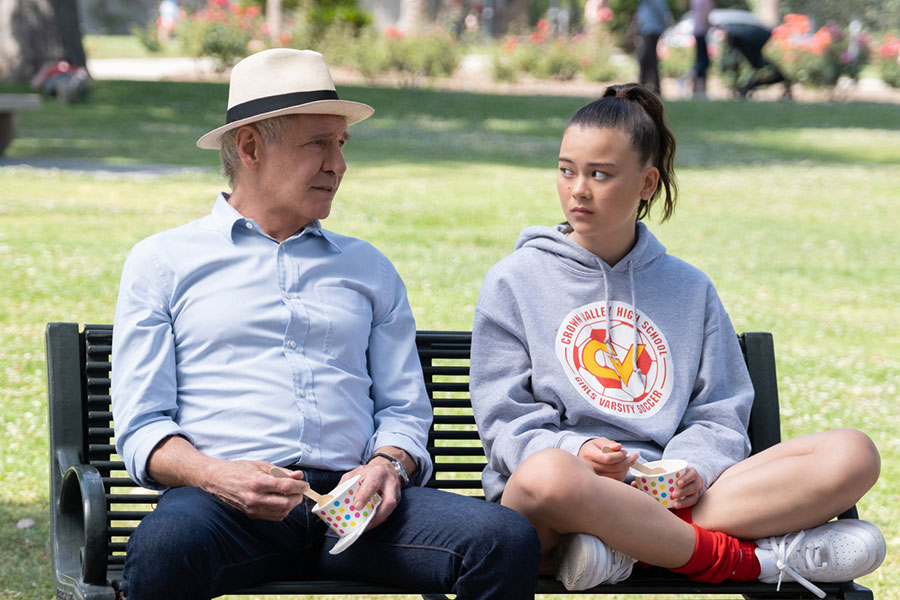‘Juniper’ With Charlotte Rampling Puts Spotlight on a Growing Trend: Cross-Generational Living

Charlotte Rampling in 'Juniper'. Photo: Jen Raoult/Parkland Entertainment
Cross-generational misunderstandings make great comedy fodder. Social media ineptitude and the divide between boomers and millennials is a running joke, for example, on hit series Only Murders in the Building (sure to add more high jinks when Meryl Streep joins in Season 3). But intergenerational friction isn’t just entertaining to watch, it also recognizes a growing trend in health and wellness studies.
According to the United Nations Department of Economic and Social Affairs factsheet, today’s population interacts on a uni-generational level more than ever before. Add to that the high cost of living and a general downturn in well-being as social networks shrank during the past three years of the pandemic, and the idea of mixing generations seems to be percolating as a solution. The return to multigenerational living is even among the rising trends in Canadian real estate (per Statistics Canada).
As both childhood and older adulthood have more leisure time, the UN intergenerational approach seems particularly relevant to foster connections. Recent reviews of intergenerational interventions have reported potential benefits such improved empathy and self-esteem in children, the report says, as well as increased self-esteem, improved mood, reintegration into family and community life and reduced loneliness in older adults.
Pop culture is keeping pace, and this season we’re seeing more of how revitalizing the transfer of accrued experience accrued can be — beyond its entertainment value.
Take Charlotte Rampling in the new movie Juniper (in cinemas now).
Rampling, 77, makes a meal out of a literal cane-banging grandmother role. Set in 1990s New Zealand, the Oscar-nominated actress (45 Years) plays Ruth, a retired photojournalist who has covered the Spanish Civil War and conflicts in Africa. With a broken leg and nurse in tow, she’s forced to recuperate at the home of her estranged son. Fortified by daily pitchers of gin, Ruth plans to live —and eventually, die — on her own terms. But not before her adversarial relationship with with sulking, grieving grandson Sam yields results. When the self-destructive teenager is suspended from school, he’s forced to look after his feisty, alcoholic grandmother as a punishment and the movie chronicles how their battle of wills turns his life around (he would otherwise be sitting in a darkened room, gaming).
Ruth may be frail but her resolve is steely — she’s rude and arrogant and she pairs brutal honesty with tough love. But their time together also works a sort of fifth-act renewal for the seemingly indomitable grandmother. (It’s a textbook study if you read a paper on how older adults use different emotion regulation strategies — like avoidance — than younger adults do.)
The story is based on writer-director Matthew Saville’s real-life experiences with his own imperious grandmother. In Juniper, Saville says he has “unashamedly written a film that deals with some of the strongest dramatic themes we are confronted with as humans: Life, love, death, grief, shame and our own mortality. Juniper is a film about the choice we make as humans to live, and to die, how we handle grief and how we embrace life. While the themes are dark, its tone is humorous, and the drama doesn’t have a touch of sentimentality.”
Numerous studies have looked at the effects not only of intergenerational programmes in nursing home settings between adolescents and older adults but also it’s more interesting to experience these examples as entertainment.
Cathleen Schine’s latest book Künstlers in Paradise (March 14) has a similar premise, exploring the importance of stories (and sharing them). It’s not only the uplifting story of another feckless grandson, redeemed. It’s also a pandemic novel insofar as it begins in early 2020 as the first COVID-19 lockdowns hit. Julian, 24, has just moved to Los Angeles to help care for his 93-year-old grandmother Mamie, whose Austrian Jewish family fled the Nazis when she was a child. Over the course of two years, as Julian goes through a series of humbling experiences (like having to be taught how to drive a stick shift) and career setbacks, Mamie unspools her life story with him.
Schine’s novel also encapsulates the ongoing Ten Stories research project at Queen’s University into the intergenerational transfer of values and meaning. Their recent paper on the subject of storytelling (covered in the Scandinavian Journal of Caring Sciences) studied constructive ways younger family caregivers can both listen constructively and be enriched by repetitive storytelling. (Because it cuts both ways.)
Shrinking (on AppleTV+) also goes there. Created by star Jason Segel with Ted Lasso’s Brett Goldstein and Bill Lawrence, the comedy series offers depictions of different generations helping one another deal with varying kinds of loss. Segel plays Jimmy, a lonely, widowed therapist who ignores the ethics of his profession and begins giving specific life advice to his patients. Harrison Ford is Paul, Jimmy’s gruff colleague and mentor who is coping with a recent Parkinson’s diagnosis (his character is partly based on Hollywood’s go-to shrink).

Shrinking also illustrates the value of human connection, like the findings of a 2021 study that found positive effects of engagement on older adults’ cognitive, social, and health outcomes. Jimmy’s teenage daughter Alice also has unofficial therapy sessions with Paul, who advises her to follow the advice he practises himself: taking 15 minutes a day to grieve (“I know what’s coming,” he says), then move on. Intergenerational research aims to promote deeper understanding and respect between generations and helps to create more cohesive communities, suggesting that it can have numerous health and social benefits.

Photo: Courtesy of AppleTV+
In Canada, studies and pilot projects are exploring the ways intergenerational connections promote seniors’ health. (I hesitated to call Harrison Ford elderly, but the man is, after all, 80).
At Toronto University Health Network’s NORC Innovation Centre, a first-of-its-kind centre advancing new models of social connection and accessible care for older adults living in the community — aging in place. As detailed in a recent Maclean’s op-ed, NORC’s ideal model is reciprocal community support for seniors who wish to age while remaining in their own homes. Rampling’s formidable character spends her final days in the care of family at home. In Schine’s novel this is also a preoccupation for Mamie, who wants to make sure she looks presentable and capable at all times: neither “insane or pitiful: she did not want Julian to feel he had to put her in a home or, perish the thought, take her back with him to his parents.”
Juniper has expanded to select Canadian cinemas (Vancouver, Toronto, Halifax, Ottawa, Victoria, Calgary and Sidney).
RELATED:
Older & Bolder: 8 Celebs Who Have Reimagined Aging – and How They Do It
Actor Michael J. Fox, 61, Accepts Honorary Oscar for Parkinson’s Advocacy
Scrooged Again: Ryan Reynolds’ ‘Spirited’ Take on the Dickens Classic Reinforces Its Enduring Appeal